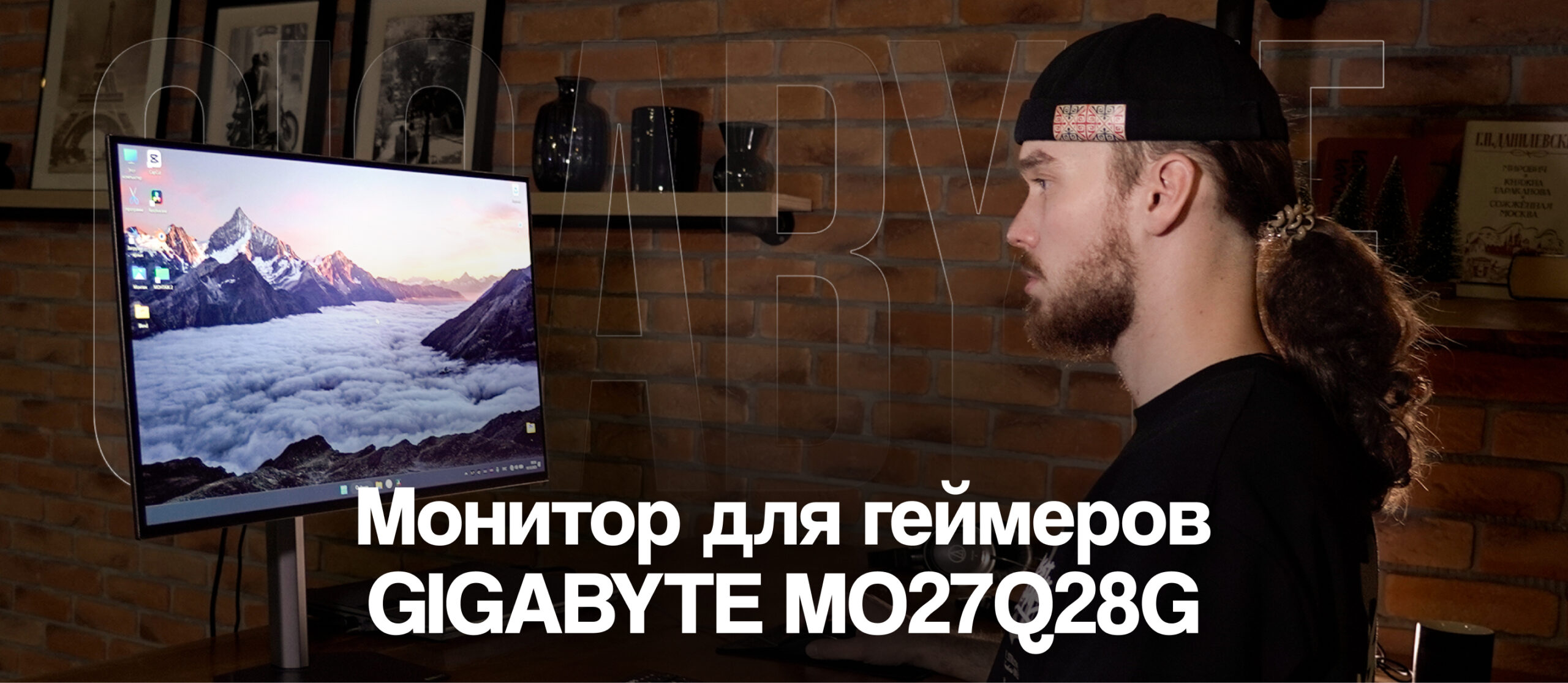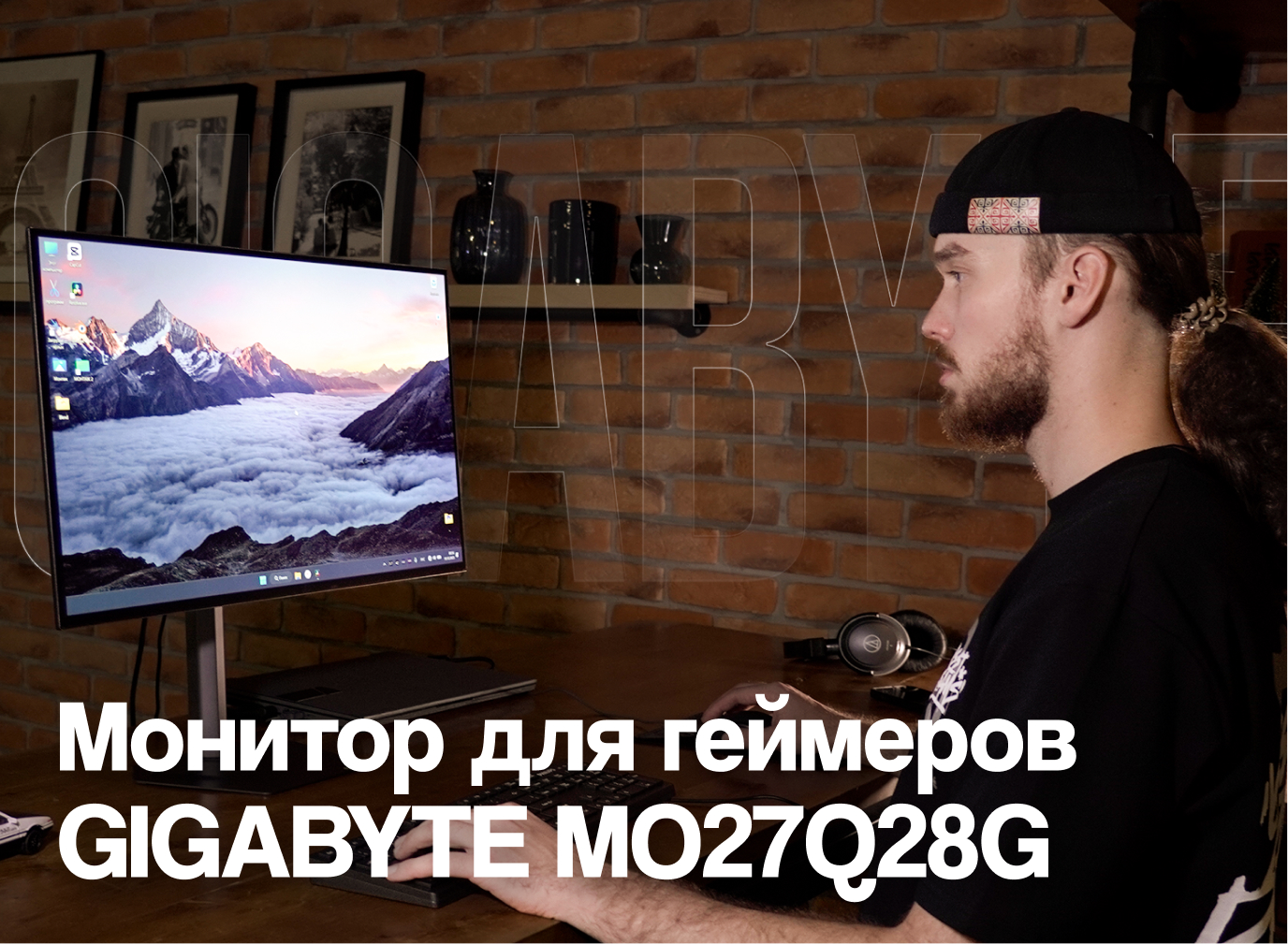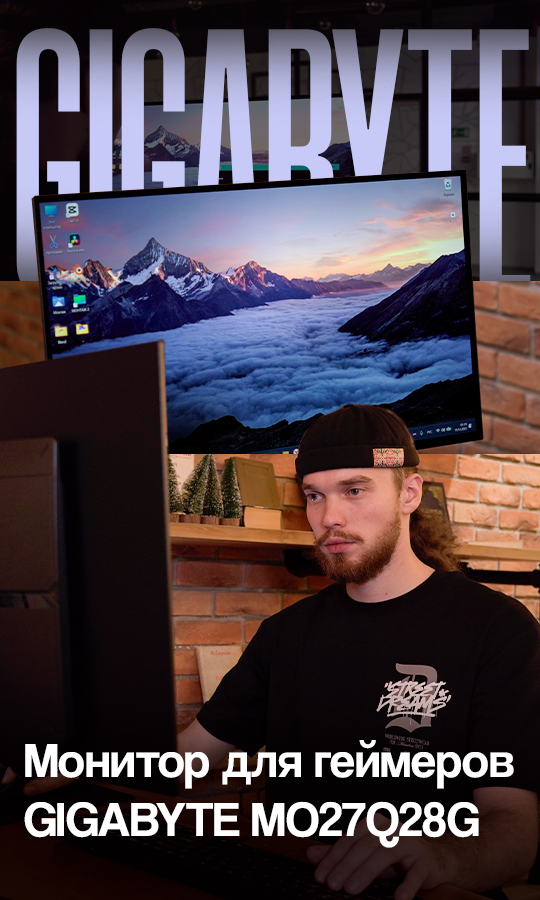Early detection of malignant tumors significantly increases the chances of successful treatment and patient survival by enabling the use of gentle and cost-effective treatment methods. This medical principle is recognized throughout the world. The Kazakhstani startup FORUS DATA has developed its own neural network model to detect early-stage lung cancer through low-dose computed tomography (LDCT) scans. Currently, the system is integrated with over 500 devices across 200+ medical institutions in Kazakhstan. In an exclusive interview with ER10 Media, FORUS DATA co-founders Ruslan Ormanbetov and Almat Mendebayev shared insights about the startup's journey, the innovative technologies it employs, and its promising future.
Follow Kazakhstan’s Startup Movement in the "100 Startup Stories of Kazakhstan", a collaborative project by ER10 Media and Astana Hub. This initiative highlights the most innovative Kazakh startups, showcasing projects that stand out for their creativity and impact. Among the heroes are Astana Hub residents, as well as creators of other innovative technological products and services. The content is available in Kazakh, Russian, and English.
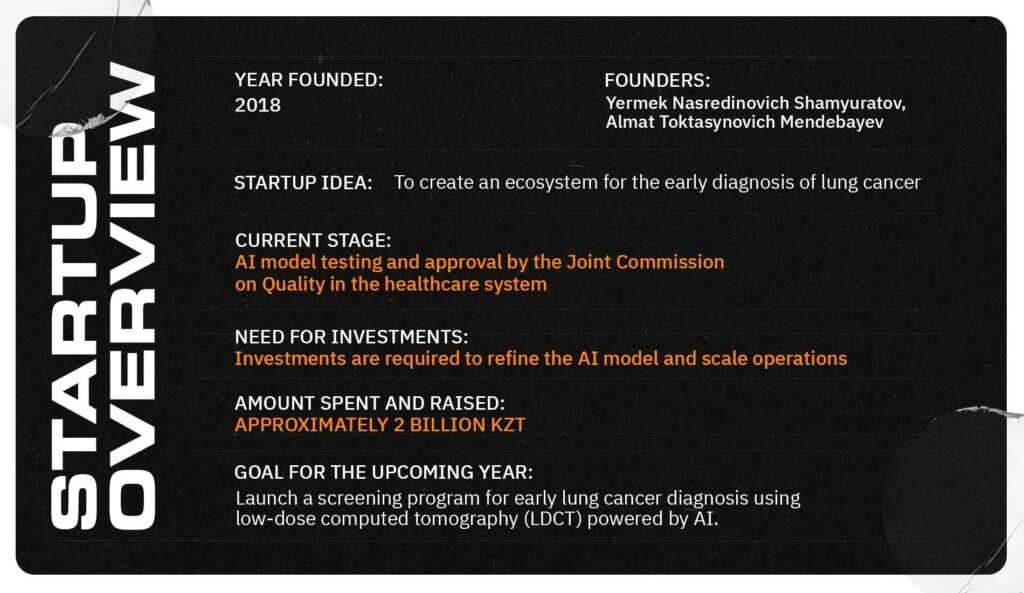
A Neural Network Saving Lives
— What is the main idea behind the FORUS DATA startup? How does it work?
Ruslan Ormanbetov: Our team has developed an artificial intelligence model capable of detecting lung cancer in its early stages. The neural network identifies suspicious lesions as small as 3mm, which could signal the onset and progression of the disease. It detects changes that even an experienced radiologist might overlook. Moreover, the system significantly eases the workload for doctors, enabling them to screen more patients as part of a mass screening program. Without our system, diagnostics typically take 40-50 minutes. With our neural network, this time is reduced to just 10 minutes, while improving the quality of analysis.
In the future, we aim to launch a large-scale screening program in Kazakhstan, allowing for regular checks of the entire population to detect malignant tumors. Medical images from healthcare institutions will be sent to a centralized PACS (Picture Archiving and Communication System) for automated processing and analysis using our AI model.
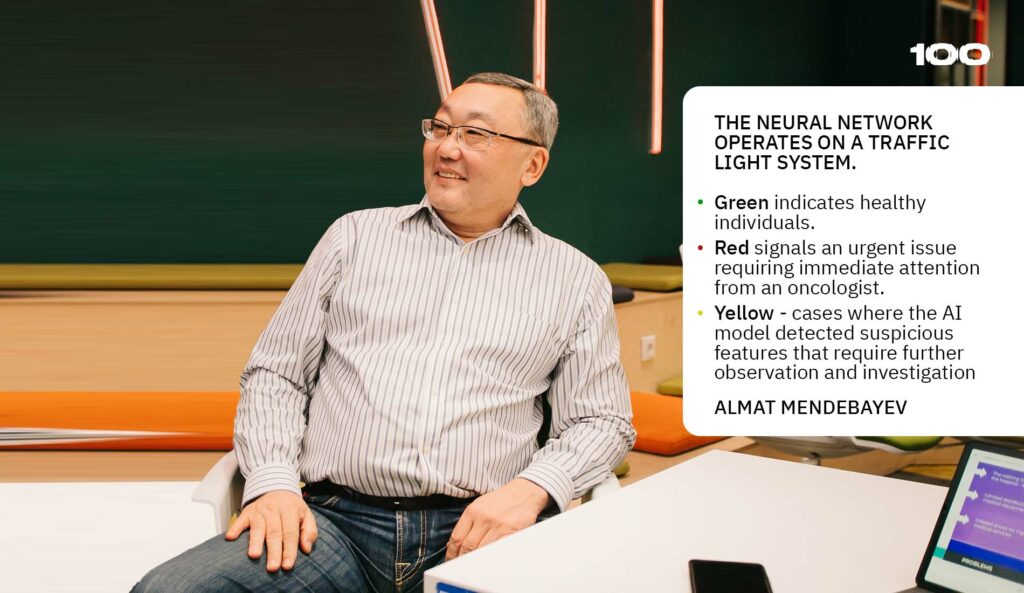
Almat Mendebayev: The neural network operates on a traffic light system. Green indicates healthy individuals. Red signals an urgent issue requiring immediate attention from an oncologist. Cases where the AI model detected suspicious features that require further observation and investigation are highlighted in yellow. The key objective is to flag such cases in the medical information system and monitor them over the next three to five months. This enables the early detection and tracking of potential issues, allowing timely intervention. With such signals from the neural network, oncologists can conduct additional examinations to confirm or rule out concerns.
— How did the idea for this startup come about?
Ruslan Ormanbetov: The idea for FORUS DATA dates back to 2017 when the term "artificial intelligence" was first mentioned during a meeting with the head of state. At that point, our team decided to try their hand at optimizing business processes in healthcare.
I should mention that one of our co-founders, Yermek Shamyuratov, is a mentor to two generations of Kazakh IT specialists. He has guided many established professionals, entrepreneurs, and government officials. A highly experienced programmer from the Soviet era, he worked on automating processes for the USSR’s Savings Bank in the 1980s.
Yermek has had a long-standing interest in medicine, and his main goal has been to transform the paradigm of medical services — redefining methods, approaches, and the interaction between healthcare institutions and patients. This vision inspired us to create a startup that could significantly improve Kazakhstan's healthcare system and potentially make an impact worldwide. We began developing a program to diagnose early-stage lung cancer through screenings of at-risk groups, including individuals of certain ages, those working in hazardous industries, smokers, and others.
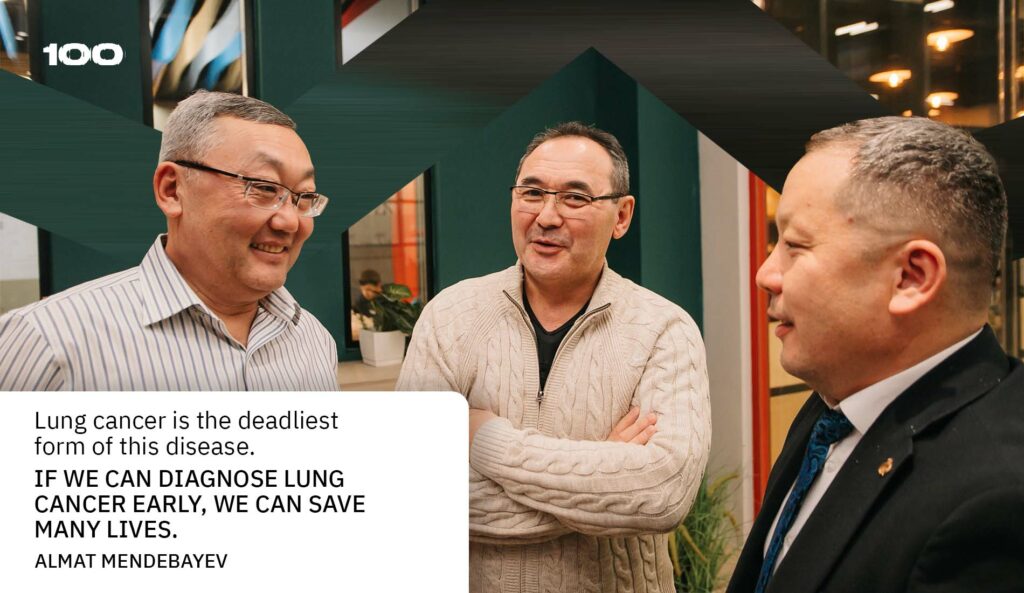
— Why did you focus on lung cancer?
Almat Mendebayev: Lung cancer is the deadliest form of this disease. Among men, the mortality rate is 4.5 times higher than from prostate cancer. For women, lung cancer is 2.5 times more fatal than breast cancer. Additionally, in terms of prevalence, lung cancer ranks second only to breast cancer, accounting for 11.4% of all types of cancer. This makes it one of the most dangerous illnesses, claiming countless lives. If we can diagnose lung cancer early, we can save many lives.
Hard Work and Dedication
— How has your startup evolved over time?
Ruslan Ormanbetov: In 2019, we received a grant from the World Bank and began developing a neural network model capable of analyzing digital X-ray images. Even at that early stage, our neural network could detect about 14 types of lung diseases.
Then the pandemic hit, and our product underwent a true "battle test." We provided the system to all hospitals in Kazakhstan, where it helped reduce the burden on doctors, enabled timely diagnoses, predicted disease progression, and minimized mortality rates.
In addition to developing the artificial intelligence model itself, we needed to select and customize a PACS system to process the information. Off-the-shelf solutions weren’t suitable for us; we needed a partner who could build a system tailored to our needs. In 2019, we signed an agreement with a Portuguese company and jointly launched our own PACSCenter, based in data processing centers in Astana and Almaty. Today, the system connects over 200 medical institutions and more than 500 pieces of digital radiographic equipment, including X-ray, CT, and MRI machines. Our PACS system operates so efficiently that it allows doctors to access patient studies from anywhere in the world. These studies can be launched directly in a browser without lengthy data downloads.
Over time, we refined our AI model. Initially, we thought we could detect early signs of disease through X-ray images. However, after consulting with specialists, we decided to adapt the neural network to work with computed tomography.
In 2020, we signed an agreement with the Kazakh Research Institute of Oncology and Radiology in Almaty (JSC "KazNIIOiR") to collaborate in this area, utilizing their facilities, leading specialists, and expertise.
At the same time, we discussed how to fully automate medical processes, from the moment a patient arrives at the clinic to the beginning of his treatment. We understood the challenges in healthcare — underfunding, a shortage of qualified personnel, and conservative approaches. This made it clear that a comprehensive and large-scale solution was required.
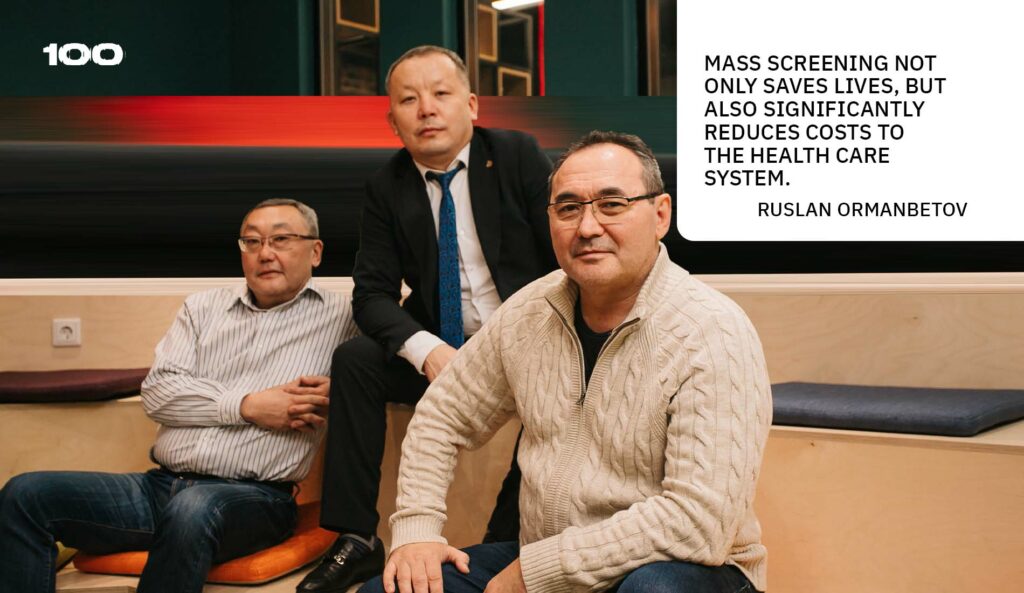
— Why is mass population screening so important?
Ruslan Ormanbetov: Detecting lung cancer in its early stages allows for more effective, less invasive, and less expensive treatment. Here’s a simple statistic: if the disease is caught at Stage I, treatment costs can be up to 500,000 KZT, with a five-year survival rate of 85-90%. This typically involves relatively safe and non-invasive medical interventions. However, if cancer is found at Stage III, the five-year survival rate drops to below 15%, and treatment costs can range from 9 million to 54 million KZT. Moreover, such treatments are often harsh and detrimental to the patient’s overall health. Mass screening not only saves lives, but also significantly reduces costs to the health care system.
— Artificial intelligence is a young and dynamic technology. Was the program developed by international or local specialists?
Ruslan Ormanbetov: It is entirely a local innovation. Our team created it, and we fully own the intellectual property rights. Our company has been in the market for 30 years, and we’ve assembled a highly skilled team capable of delivering world-class products. The pace of AI development is so rapid that substantial advancements occur monthly. To keep up, our Head of Data Science is currently in the US undergoing advanced training to further improve our platform.
— Who makes up the development team—are they programmers or medical professionals?
Almat Mendebayev: This is a large-scale project with a multidisciplinary team. We have developers, a team responsible for coordinating with medical professionals and government authorities, and support from specialists at JSC "KazNIIOiR." They test our models and help improve them.
A Crucial Project Awaits Its Moment
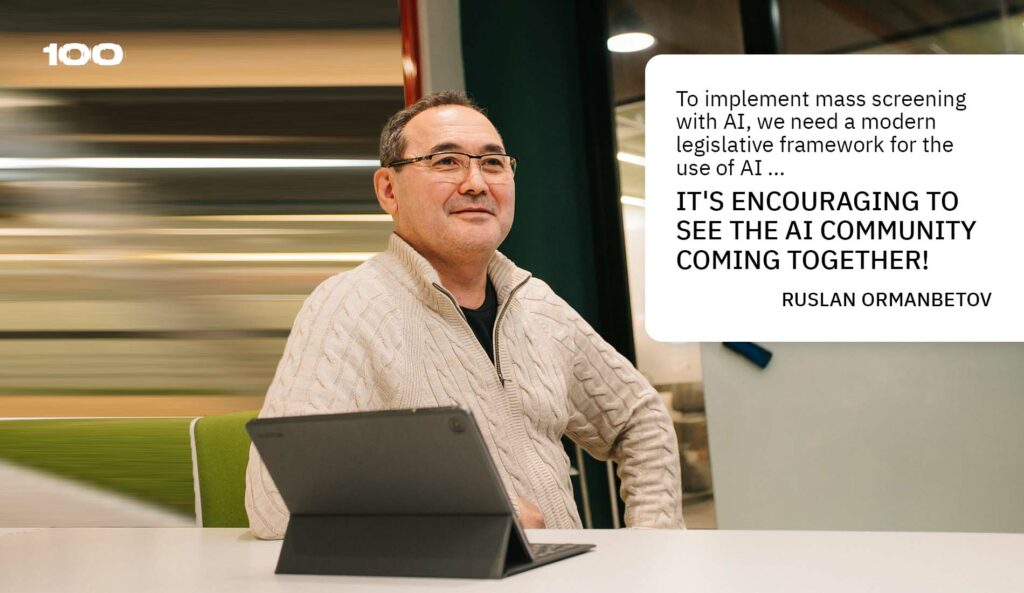
— Your project is clearly essential for the healthcare system. Why hasn’t Kazakhstan implemented mass lung cancer screening yet?
Ruslan Ormanbetov: The main challenge lies in the fact that our project requires government support. Screening programs involve providing free medical services to the population, funded by the national health insurance system and state budget. To implement mass screening with AI, we need a modern legislative framework for the use of AI and, most importantly, a clear understanding in the relevant ministries of the need to adopt global trends and technologies.
Despite support from the Ministry of Digital Development, Innovations, and Aerospace Industry (MDDIAI) and QazInnovations, the bureaucratic mechanisms in our country make it difficult to implement any innovation in a reasonable timeframe. This is why startups like FORUS DATA and Cerebra have become pioneers in MedTech, breaking through the ice of conservatism and bureaucracy like icebreakers. The AI Development Association has stepped in to help resolve several legal challenges, and it's encouraging to see the AI community coming together!
Both FORUS DATA and Cerebra have faced the possibility of shutting down their projects in Kazakhstan and relocating to other countries. Cerebra has already entered international markets, and we wish them success! However, we are committed to launching in Kazakhstan—our homeland.
We’ve invested around 2 billion KZT into the startup, but we cannot move to commercialization due to administrative barriers. Numerous regulatory bodies are involved in decision-making, which significantly delays the approval process.
Almat Mendebayev: A screening program for lung cancer using low-dose computed tomography was previously included in the “Comprehensive Plan for Fighting Cancer in Kazakhstan for 2023-2027,” approved by Government Decree No. 874 on October 5, 2023, under the leadership of Prime Minister Mr. A. Smailov. However, the Ministry of Health has yet to approve the use of AI technologies in medical practice. The screening program is still in the approval stage. Currently, we are awaiting a decision from the Joint Commission on Quality of the Ministry of Health, which must approve the health technology assessment. After that, the Ministry and its structural divisions need to develop a tariff to fund screening as a medical service incorporating AI. Only then can we move the system into industrial operation.
Ruslan Ormanbetov: Significant funding was allocated for the program, but in the spring, many regions experienced severe flooding. As a result, the government reallocated and reduced funding for various programs to provide resources for disaster recovery. Our selection program was delayed. Then all key ministers and the Prime Minister were replaced, forcing us to start negotiations with the government from scratch.
Almat Mendebayev: It’s important to note that the World Health Organization (WHO) recommends lung cancer screening with low-dose computed tomography for all countries.
A Promising Future
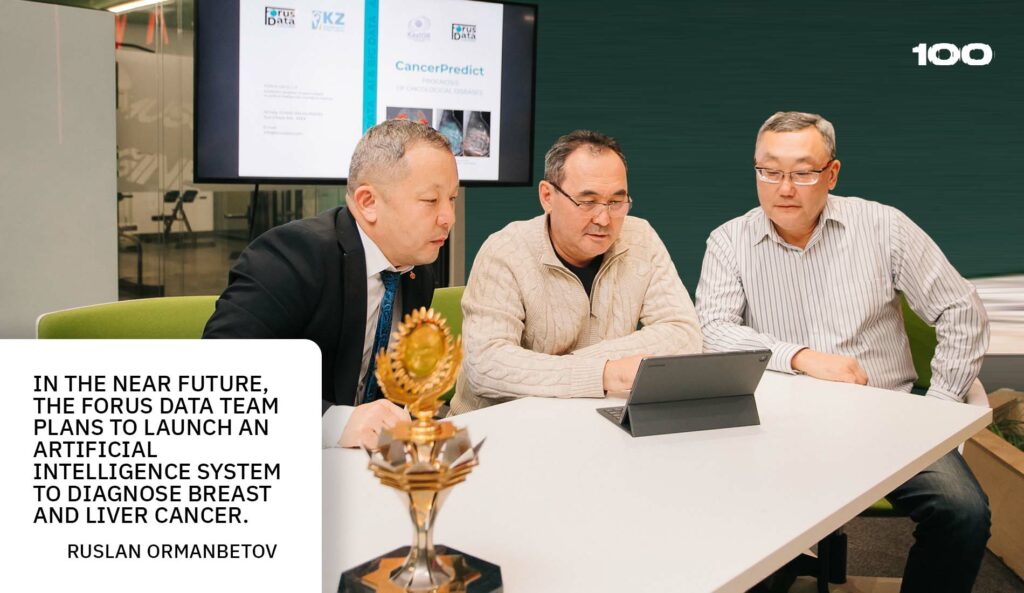
— What are your future plans? Will you continue improving the AI model?
Ruslan Ormanbetov: In the near future, the FORUS DATA team plans to launch an artificial intelligence system to diagnose breast and liver cancer. Our PACS system, with proper configuration and neural network training, is capable of diagnosing various diseases at early stages. However, without commercialization, we cannot expand the AI system or continue testing, so these initiatives are currently on hold.
— Does your startup need investments? If so, how much?
Ruslan Ormanbetov: Yes, we need investors to develop and scale our system. But investors typically focus on numbers—expenses, revenues, and potential profits. At this stage, we can only show expenses, not revenues, although the projections look very promising on paper!
We are looking to scale up the project in other countries and have already had preliminary discussions with Uzbekistan, UAE, Saudi Arabia and the World Bank about lung cancer screening programs. However, before entering international markets, we need to first launch the project in Kazakhstan and fine-tune all business processes. Afterward, we plan to collaborate with investors and obtain FDA certification in the U.S.
— So, would you like FORUS DATA to become a global unicorn?
Almat Mendebayev: It has every chance to achieve that. Our platform could grow into a massive global system for processing, analyzing, and storing patient data.
— Does your startup have global competitors?
Ruslan Ormanbetov: In Kazakhstan and Central Asia, there are no similar developments. Russia had a comparable project based at the Botkin Institute, but it lost investor interest for obvious reasons, so we no longer follow its progress. Globally, there are certainly others working in this field, but everyone has different approaches and methods. I believe our technology can compete on an international scale. We have experience in engineering, implementing global systems, and working with big data.
— How long have you been in entrepreneurship?
Ruslan Ormanbetov: Almat and I started our business in 1994. This year marks the 30th anniversary of the founding of our company, IBS GROUP. It operates in the field of business process automation and equipment supply, primarily in the banking sector. So, we are entrepreneurs with extensive experience.
— Which sport would you compare to your entrepreneurial spirit?
Ruslan Ormanbetov: I play hockey. It’s a team sport. No matter how strong your opponent is, teamwork, persistence, and determination can lead to victory.



